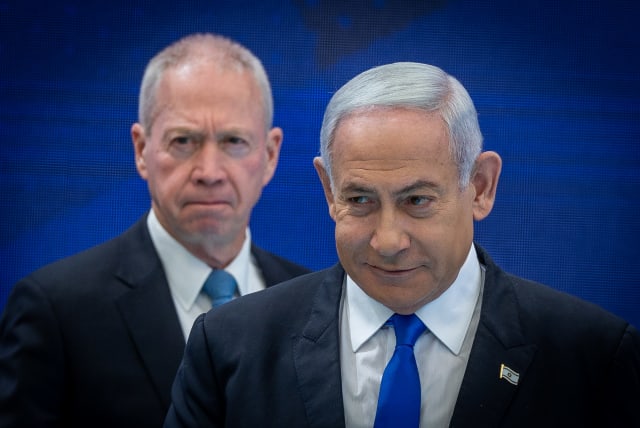Israel appeals to overturn ICC arrest warrants

In the best-case scenario, sources indicated that the ICC Appeals Court could reverse or freeze the arrest orders until ICC sends a new notification to Israel.
Israel filed its official appeal against the arrest warrants approved by the lower court of the International Criminal Court for Prime Minister Benjamin Netanyahu and former defense minister Yoav Gallant on Sunday.
Sources indicated to The Jerusalem Post that the hope is to get the ICC Appeals Court to reverse or freeze the arrest warrants by taking advantage of a mix of possible substantive and procedural holes left open by both the lower court and the ICC prosecutor.
According to Israel, supported by the US, Germany, and some others, the ICC lower court and prosecutor jumped the gun on approving arrest warrants because they did not fully address Israel’s jurisdictional objections and because they did not give Israel an updated warning and a specific update about what the allegations were as required under Articles 18 and 19 of the ICC’s Rome Statute.
Israel and some of its allies had made this same argument to the ICC’s lower court, but the court rejected the jurisdictional claims as premature. It also rejected the procedural claims, saying that a prior notification to Israel in 2021, as well as later public statements, along with the fact that the topics being probed were similar, meant there was no need for a new notification.
In the appeal, Israel helped to overturn the idea that the ICC can have jurisdiction over Israel despite it not being a party to the Rome Statute as well as because of limits on the court’s jurisdiction arising from the Oslo Accords.
Israel has also claimed that the lower ICC court was mistaken about notice provisions. Since the 2021 warning from the ICC prosecutor only pertained to the 2014 conflict, and the 2024 war is a completely different kind of war, the ICC prosecutor had to give a new notification of his intention to probe the issues should Israel not do so.
Moreover, Israel claimed that the ICC prosecutor needed to give the Jewish state specifics about the instances that it was probing.
In the best-case scenario, sources indicated that the ICC Appeals Court could reverse or freeze the arrest orders until the ICC prosecutor sends a new notification to Israel, and Jerusalem has some additional time to probe the issues in question.
However, there are two potential significant problems with this strategy.
A long shot appeal
First, it is a long shot that the ICC Appeals Court will overrule the lower ICC court.
Though this has happened in some rare cases, most of the UN legal system is extremely critical of Israel’s conduct in the war, and it is unlikely they will allow Israel to use jurisdictional or procedural arguments to defer the progress of the probe and arrest warrants against Israeli officials.
Additionally, even if the ICC Appeals Court were to freeze or temporarily reverse the arrest warrants, the only way that Israel could likely avoid the warrants from being reissued or significantly delay them would be to open its own state inquiry into whether government war decisions were legal.
To date, the IDF has opened over 85 criminal probes, hundreds of disciplinary probes, and will likely reach thousands of preliminary reviews of potential alleged war crimes by its own soldiers.
These probes have protected and will likely stop or at least delay, for years, ICC war crimes probes into soldiers’ actions
In contrast, there has been no probe of government decisions to date, despite the fact that virtually all current and former government and IDF lawyers have been calling for such a probe for several months.
Even if the probe found that war crimes were not committed, which it likely would, the probe itself and the detailed justifications for such a determination could nullify or delay the arrest warrants of Netanyahu and Gallant.
On November 21, the ICC lower court said there were reasonable grounds to believe that Netanyahu and Gallant committed the war crime of starvation as a method of warfare and the crimes against humanity of murder, persecution, and other inhumane acts.
While Israel and the US condemned the ruling – which is the first time the court issued arrests for officials from a democratic state – as biased or going beyond the ICC’s mandate, a number of EU countries said they would honor the arrest warrants.
A third group of countries, like France, first said they would honor the warrants but then backtracked, saying that Netanyahu, as a head of state, had a special immunity.
This means that Netanyahu and Gallant will likely be unable to travel to most European countries and a variety of other nations in the ICC’s 120-plus member states.
They will still be able to travel to the US, which is not an ICC member, and various Middle Eastern and other states.There are also some states that have ignored ICC arrest warrants, given that there is no real enforcement mechanism.
In its November 21 decision, the lower ICC court did not address the substantive arguments made by Israel and its allies about the holes in proving any cases of deliberate killing or starving of Palestinian civilians as a policy.
Rather, the court said that there was sufficient evidence for the probe and arrests to go forward and that Israel would be able to make such claims at a later legal stage or at a potential future trial.
Jerusalem Post Store
`; document.getElementById("linkPremium").innerHTML = cont; var divWithLink = document.getElementById("premium-link"); if (divWithLink !== null && divWithLink !== 'undefined') { divWithLink.style.border = "solid 1px #cb0f3e"; divWithLink.style.textAlign = "center"; divWithLink.style.marginBottom = "15px"; divWithLink.style.marginTop = "15px"; divWithLink.style.width = "100%"; divWithLink.style.backgroundColor = "#122952"; divWithLink.style.color = "#ffffff"; divWithLink.style.lineHeight = "1.5"; } } (function (v, i) { });

